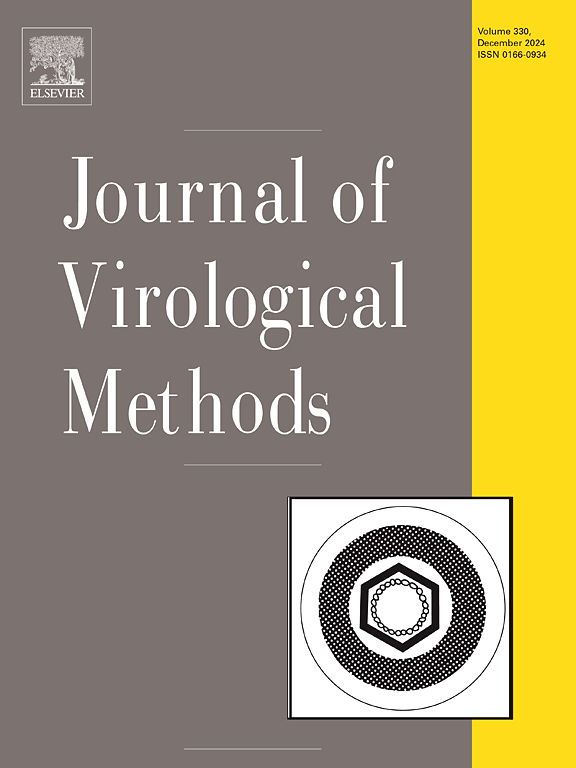Evaluation of optimized ELISA to detect anti-cytomegalovirus antibodies against immunogenic proteins
IF 1.6
4区 医学
Q3 BIOCHEMICAL RESEARCH METHODS
引用次数: 0
Abstract
Herpesviruses are common viruses that have infected the vast majority of people around the globe. Accurate diagnosis of these viruses using cost-effective methods is important, especially for asymptomatic cases. Diagnostic differentiation between naturally occurring antibodies and other antibodies is an area that requires investigation. The aim of this study was to optimize an immunoassay to detect anti-herpesvirus antibodies directed against immunodominant proteins. A total of 120 sera were collected at two stages (62 samples for the pilot experiment during coronavirus pandemic, and 58 samples were collected recently). An ELISA test was developed using cytomegalovirus phosphoprotein 150 (pp150) and herpes simplex virus 2 glycoprotein D (HSV-2 gD) to test the specificity of the test. The cutoff value was 0.218, which indicates low background noise. There was competitive binding of the CMVpp150 as competitor compared to HSV-2 gD. The test can be reliably used to specifically determine anti-viral immunodominant proteins. Future studies should explore the binding of antibodies to other specific viral antigens to further expand the scale of testing. Furthermore, studies should be performed to reproduce these results with comparability using commercial kits.
免疫原性蛋白抗巨细胞病毒抗体ELISA检测优化后的评价
疱疹病毒是一种常见的病毒,感染了全球绝大多数人。使用具有成本效益的方法对这些病毒进行准确诊断非常重要,特别是对无症状病例。自然产生的抗体和其他抗体之间的诊断区别是一个需要研究的领域。本研究的目的是优化一种免疫分析法,以检测针对免疫优势蛋白的抗疱疹病毒抗体。分两个阶段采集120份血清(新冠肺炎大流行期间试点采集62份,近期采集58份)。建立了以巨细胞病毒磷酸蛋白150 (pp150)和单纯疱疹病毒2糖蛋白D (HSV-2 gD)为检测试剂的ELISA检测方法。截止值为0.218,说明背景噪声较低。与HSV-2 gD相比,CMVpp150存在竞争性结合。该试验可可靠地用于特异性测定抗病毒免疫优势蛋白。未来的研究应探索抗体与其他特异性病毒抗原的结合,进一步扩大检测规模。此外,应使用商业试剂盒进行研究以再现这些结果,并具有可比性。
本文章由计算机程序翻译,如有差异,请以英文原文为准。
求助全文
约1分钟内获得全文
求助全文
来源期刊
CiteScore
5.80
自引率
0.00%
发文量
209
审稿时长
41 days
期刊介绍:
The Journal of Virological Methods focuses on original, high quality research papers that describe novel and comprehensively tested methods which enhance human, animal, plant, bacterial or environmental virology and prions research and discovery.
The methods may include, but not limited to, the study of:
Viral components and morphology-
Virus isolation, propagation and development of viral vectors-
Viral pathogenesis, oncogenesis, vaccines and antivirals-
Virus replication, host-pathogen interactions and responses-
Virus transmission, prevention, control and treatment-
Viral metagenomics and virome-
Virus ecology, adaption and evolution-
Applied virology such as nanotechnology-
Viral diagnosis with novelty and comprehensive evaluation.
We seek articles, systematic reviews, meta-analyses and laboratory protocols that include comprehensive technical details with statistical confirmations that provide validations against current best practice, international standards or quality assurance programs and which advance knowledge in virology leading to improved medical, veterinary or agricultural practices and management.

 求助内容:
求助内容: 应助结果提醒方式:
应助结果提醒方式:


